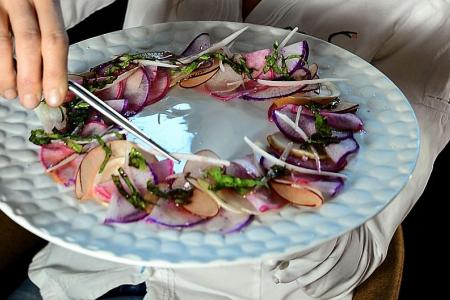Four things to know before adopting a plant-based diet
Knowledge of the benefits and detriments will help you reap maximum gains, say experts
When it comes to food, a plant-based diet seems to be the newest kid on the block, trending after the likes of keto, raw food, paleo and flexitarian.
But it has actually been around for some time, merging with philosophies behind vegetarianism and veganism and a love for all things living.
A plant-based diet has many variations, based on a person's goals. But the strictest definition comes down to eating fruit, vegetables, legumes, grains, lentils, beans, nuts and everything else that comes from the ground, said Mr Louis Chan, master trainer and sports/fitness nutritionist at ISSA Academy Singapore.
It is a good recourse from modern-day meat-heavy diets, said Ms Jacyln Reutens, clinical and sports dietitian and founder of Aptima Nutrition & Sports Consultants.
"It is also lower in saturated fat, sodium, trans fat and added sugars, which are linked to lifestyle diseases such as diabetes, heart problems, stroke, cancer and gout," she said.
Order healthy plant-based meals from your favourite restaurants and enjoy maximum discounts with foodpanda Promos
Plant-based diets de-emphasises the contribution of meat to our health and diet, so it differs from vegetarianism or veganism as it allows you to eat meat, fish, dairy and other animal products in small amounts.
That said, both experts insist it should be approached with full knowledge of the benefits and detriments in order to reap maximum gains.
Here is what you need to know.
Balance your diet
We are often flooded with social media posts of celebrities and athletes professing how cutting down on meat has not only helped with weight loss, but also increased their energy levels.
On the other hand, we have meat lobbyists preaching "no meat equals no protein".
Mr Chan said: "There are many myths and half-truths circulating on the Internet about plant-based diets, the biggest among them that proteins contained in plants are 'incomplete'.
"This is not true.
"A large variety of plants provide protein - from grains, nuts and legumes to leafy greens - and not just in tiny amounts."
That does not mean all vegetables are good either.
An excessive and sudden intake of vegetables can cause stomach discomfort, said Ms Reutens.
So it is important to ensure all meals are well-balanced with carbs, protein and fibre.
Mr Chan highlighted one difference in plant-based protein - it lacks certain amino acids.
He said: "Our bodies require nine kinds of amino acids, this is aside from the 11 that are naturally produced. Most plant-based options do not include all nine, so it is necessary to mix foods to obtain the best plant protein make-up.
"For instance, beans are high in lysine but low in methionine. Rice, however, is low in lysine and high in methionine. Put these two ingredients together and you have a whole food, plant-based protein that covers all your bases."
Pace yourself
Plants are rich in prebiotics, which is food for the good bacteria in your gut - probiotics.
So a plant-based diet is good for the growth of healthy gut bacteria, said Ms Reutens.
"A healthy gut also means your immune system is optimal. A plant-based diet is low in sodium and high in potassium, which offers better blood glucose control."
It is important, however, to start slow and build up.
"If you have been eating animal protein seven days a week, cut back to five or six days for one to two weeks," she added.
"Subsequently, drop it until you are eating it twice a week. Simultaneously, increase your fruit and vegetable intake to two servings each day. Increase the servings gradually till you meet your target."
One serving of vegetable equals to ¾ cup. One serving of fruit is a medium-sized apple or a wedge of papaya.
Rightsize your meals
Ms Reutens said: "Plant-based does not mean all vegetarian foods are better. You still need to be mindful of cooking methods and the types and amounts of sauces used.
"For instance, some Chinese vegetarian foods tend to be deep-fried, and Indian vegetarian foods tend to be high in fat because of the ghee and butter that are frequently used."
Moreover, not all plants are less dense in calories than their meat counterparts, so you should be mindful of your intake. With some foods, you need to consume more to get the same number of calories, and others less.
Un-process it
Whatever your reasons for opting for a plant-based diet, the foundation is to keep it healthy and balanced at all times.
A whole food, plant-based diet is the way to go as it focuses on unprocessed food.
"The more important element in terms of overall health and wellness has less to do with animal or non-animal, and far more to do with the degree to which it is processed," said Mr Chan.
"Simply switching from a protein powder that includes animal products to one that doesn't include animal products isn't going to change a whole lot - you are still consuming a processed food."
Although the current meat-less alternatives make it less difficult for meat-eaters to change their eating habits, they are not the healthier alternative, but just a tasty vegetarian option that is "almost comparable with regular meat", said Ms Reutens.
This article was first published in The Singapore Women's Weekly (www.womensweekly.com.sg).
Get The New Paper on your phone with the free TNP app. Download from the Apple App Store or Google Play Store now



